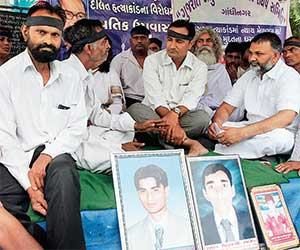Very Few Punished For Attacking Dalits
 Gujarat: Attacks on Dalits in the past year had brought the State to a boil, but a peek into the conviction rate in cases against members of the Scheduled Castes has brought out some startling figures. As per the recent national police data, convictions for such crimes stood at little over 1per cent in Gujarat. While the total number of crimes against Scheduled Castes has remained more or less stable at over 1,000 every year, the number of convictions has gone down drastically in four years since 2012. As per the National Crime Records Bureau, it fell from 6 per cent to 1per cent in the State. In 2012, 1,026 cases were registered in the State, which went up to 1,190 the next year.
Gujarat: Attacks on Dalits in the past year had brought the State to a boil, but a peek into the conviction rate in cases against members of the Scheduled Castes has brought out some startling figures. As per the recent national police data, convictions for such crimes stood at little over 1per cent in Gujarat. While the total number of crimes against Scheduled Castes has remained more or less stable at over 1,000 every year, the number of convictions has gone down drastically in four years since 2012. As per the National Crime Records Bureau, it fell from 6 per cent to 1per cent in the State. In 2012, 1,026 cases were registered in the State, which went up to 1,190 the next year.
It came down to 1,075 in 2014 and further to 1,009 in 2015. However, if we compare these with the conviction rate, there were only 65 convictions in 2012. These went down by more than 50 per cent to 29 convictions in 2013. Again it fell to 26 in 2014 and in 2015, the number of convictions nosedived to just 11. So, if we take into account the conviction rate, it fell from 6 per cent in 2012 to 1 per cent in 2015. A drastic drop considering that there has been no reduction in the number of cases being registered each year in the state.
Advocate Govind Parmar who has helmed many atrocity cases over the years, said, “It so happens that the courts are overflowing with cases. Neither the investigating agencies, nor the public prosecutors have time enough to concentrate on each case. Hence, the cases drag on for years.” Citing a case from Keshod taluka, Parmar said, “There is an atrocity case of 1999 when 48 were injured in clashes between communities. There were 48 complainants and 86 accused in the case, some of whom have already died. Now, 17 years later, the case continues in court.”
According to Dalit activist Manjula Pradeep, “The main reason for lack of convictions are due to delay in proceedings, the lack of good public prosecutors and the mindset of the judiciary where it is often felt that victims may be misusing the law. However, this is belied by the fact that there are so many cases being charge sheeted.” Additional Public Prosecutor Manisha Sendar, however, presents a different picture. “Most of the times, the-re is a compromise between the parties. Sometimes this happens when we have high hopes of a conviction in a case. Nobody speaks in the witness box, the case goes on and then they tell the court they have resolved it out of court.
There is already a lot of pressure on courts but since the special courts have come up for atrocity cases, there is faster clearing of cases,” Sendar said. In another case of delayed justice, afamily of 14 has been fighting for justice for their son Lalji Sarvaiya who was burnt alive by a mob of 500 in Ankolali village of Una in 2012. The family lost their home, all belongings and had to flee the village for fear of being killed. The family has been detained four times in five years for protesting and threatening to attempt suicide in their bid for faster justice.
The family is yet to be rehabilitated and the case is still sub-judice in the high court. Lawyer Naina Bhatt said, “Due to delay in justice and negligence of prosecution, witnesses agree for settlement and turn hostile. The convictions are also less because in many cases, the accused may be convicted under IPC and not Atrocity Act, which is what happened in the Patan rape case.”
Another public prosecutor on condition of anonymity too claimed the main reason for lack of convictions is compromise. “In 95% cases, compromise takes place as in many cases it is neighbours who have fought and they ultimately resolve their issues. Approximately, if 11judgments are declared in a month, 10 of them will be of compromises.”
Source: Ahmedabad Mirror





